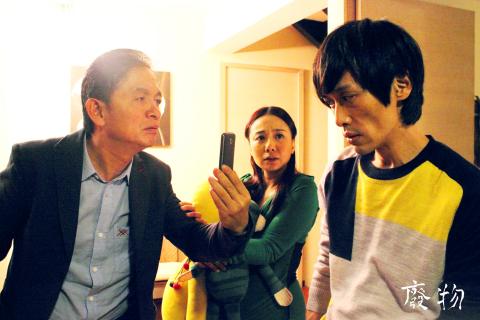Departing from a narrative about the city’s misfits and the displaced in A Place of One’s Own (一席之地, 2009), writer-director Lou Yi-an (樓一安) turns to rural underdogs for his second feature film The Losers (廢物), a socially-conscious drama that tackles some of the difficult issues facing Taiwan’s farming villages as told through the stories of those deemed “losers.”
Articulately written and finely executed, the film is a brave probe into the dark sides of rural life that finds little, if any, treatment in the current genre-inclined Taiwanese cinema.
Among Lou’s losers, Shiou, played by theater veteran Hsu Hua-chien (徐華謙), is a struggling stage actor in Taipei who works odd jobs to make ends meet. Frustrated, he returns to his Greater Kaohsiung suburb hometown, Meinong (美濃), only to be greeted with a disapproving look from his aging father, who claims that those who stay in town are either drug addicts or jobless.

Photo Courtesy of Good Days Film
While trying to learn about his farmer father’s trade and grow tomatoes on the family farm, Shiou meets an old girlfriend, Mei-shia, played by Tsou singer and actress Paicx Yatauyungana, better known by her Chinese name, Kao Hui-chun (高慧君). Now married, Mei-shia lives an affluent but spiritless life in a mansion along with her teenage son Ah-pan (Pan Chin-yu, 潘親御), as the husband and father, Tian-jin (Lin Chih-ju, 林志儒), spends most of the time away in China, accumulating wealth.
Soon, the flame is rekindled between the failed actor and the bored wife.
Ah-pan, a typically troubled teen, befriends classmate Yu-mei (Chiu Su-chin), a girl from a poor household barely sustained by her Vietnamese mother. Unable to find work after a serious workplace injury, Yu-mei’s father has been in and out of jail for stealing to support his drug habit.
The newly found friendship between the two turns into a romance, then a romance in jeopardy when Yu-mei finds out about Ah-pan’s ketamine abuse, which offers a quick escape from the dead-end mentality of small town life.
Meanwhile, real-estate speculators have been systematically buying the fertile land of Meinong, aiming at property development. Shiou’s family farm is no exception from the development craze, and industrialist Tian-jin is eager to get his hands on it.
Compared to the director’s loud, uneven debut feature, The Losers suggests a more assured direction that lays out the multitude of issues Lou wishes to examine at a thoughtful pace. Drug abuse, rural poverty and land exploitation are among the most obvious. Looming in the background is the omnipotent force of capitalist globalization, colluding with misguided agricultural policies.
And it is the underprivileged who are hit the hardest. A sense of defeat pervades the film, whether an aging farmer, Southeast Asian immigrant, disillusioned youth or an Aboriginal resident, unnamed and unrecognizable on her own land. At one point, the simmering discontent and frustration boil over, somewhat feebly, through the character of Ah-pan, who, high on ketamine, sinks back into oblivion while listening to the sound of Kou Chou Ching’s (拷秋勤) Civil Revolt (官逼民反), a song that has often been played over the past few months at protests on Ketagalan Boulevard.
But Lou deals with this raw anger intelligently. As in his previous work, he uses dark humor to examine injustice and oppression. It mocks and makes the unbearable absurd and comic, while adorning his characters and their struggles with a new sense of warmth.
Along with Cho Li’s (卓立) less successful The Rice Bomber (白米炸彈客), which opened in local theaters last month, The Losers brings a largely absent and thus much-needed focus on Taiwan’s rural life, raise important, difficult questions in a manner accessible to anyone who is concerned.

Words of the Year are not just interesting, they are telling. They are language and attitude barometers that measure what a country sees as important. The trending vocabulary around AI last year reveals a stark divergence in what each society notices and responds to the technological shift. For the Anglosphere it’s fatigue. For China it’s ambition. For Taiwan, it’s pragmatic vigilance. In Taiwan’s annual “representative character” vote, “recall” (罷) took the top spot with over 15,000 votes, followed closely by “scam” (詐). While “recall” speaks to the island’s partisan deadlock — a year defined by legislative recall campaigns and a public exhausted

In the 2010s, the Communist Party of China (CCP) began cracking down on Christian churches. Media reports said at the time that various versions of Protestant Christianity were likely the fastest growing religions in the People’s Republic of China (PRC). The crackdown was part of a campaign that in turn was part of a larger movement to bring religion under party control. For the Protestant churches, “the government’s aim has been to force all churches into the state-controlled organization,” according to a 2023 article in Christianity Today. That piece was centered on Wang Yi (王怡), the fiery, charismatic pastor of the

Hsu Pu-liao (許不了) never lived to see the premiere of his most successful film, The Clown and the Swan (小丑與天鵝, 1985). The movie, which starred Hsu, the “Taiwanese Charlie Chaplin,” outgrossed Jackie Chan’s Heart of Dragon (龍的心), earning NT$9.2 million at the local box office. Forty years after its premiere, the film has become the Taiwan Film and Audiovisual Institute’s (TFAI) 100th restoration. “It is the only one of Hsu’s films whose original negative survived,” says director Kevin Chu (朱延平), one of Taiwan’s most commercially successful

The primaries for this year’s nine-in-one local elections in November began early in this election cycle, starting last autumn. The local press has been full of tales of intrigue, betrayal, infighting and drama going back to the summer of 2024. This is not widely covered in the English-language press, and the nine-in-one elections are not well understood. The nine-in-one elections refer to the nine levels of local governments that go to the ballot, from the neighborhood and village borough chief level on up to the city mayor and county commissioner level. The main focus is on the 22 special municipality